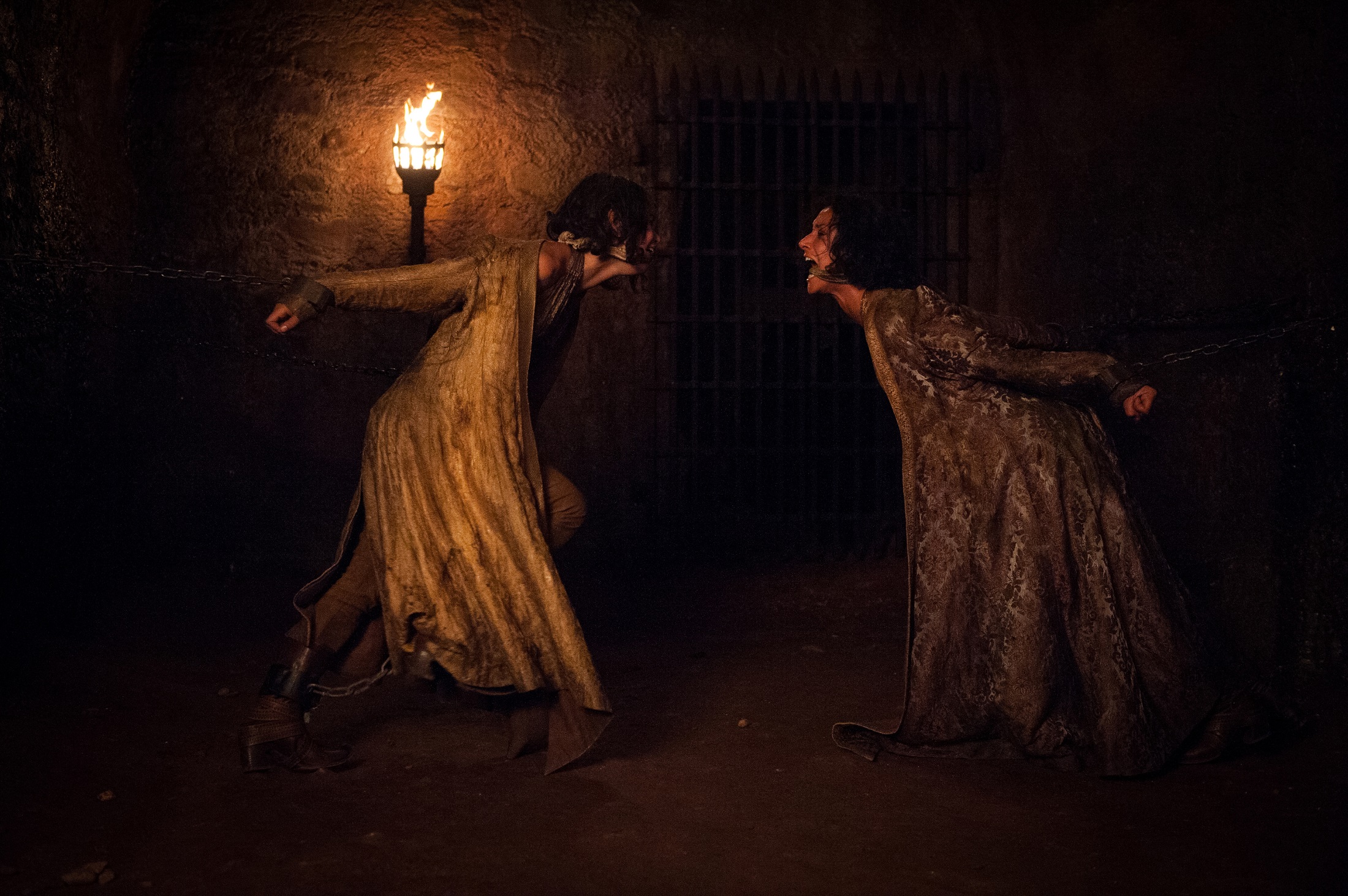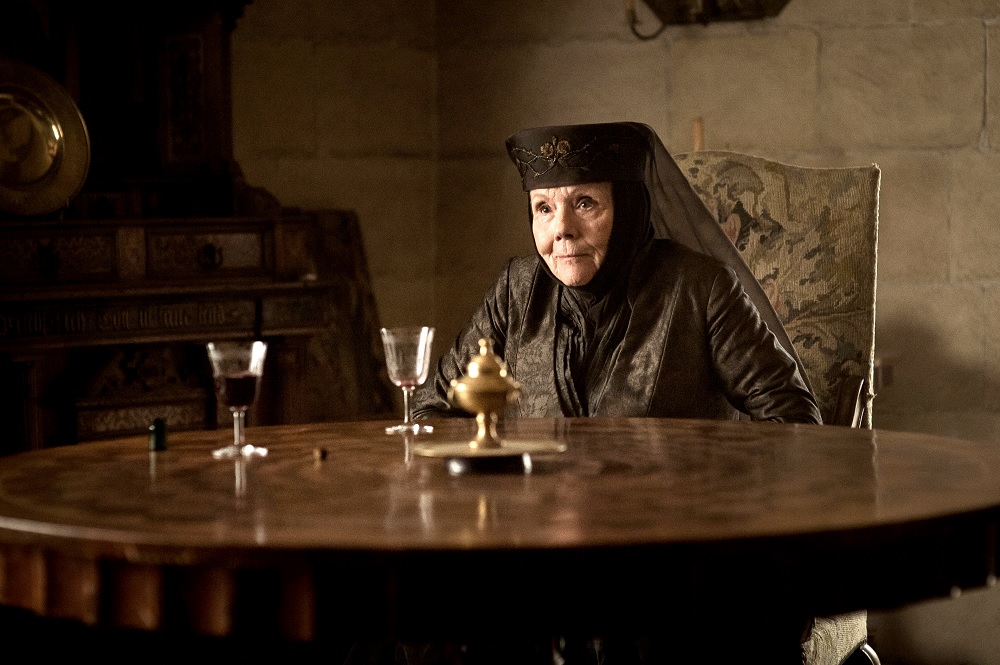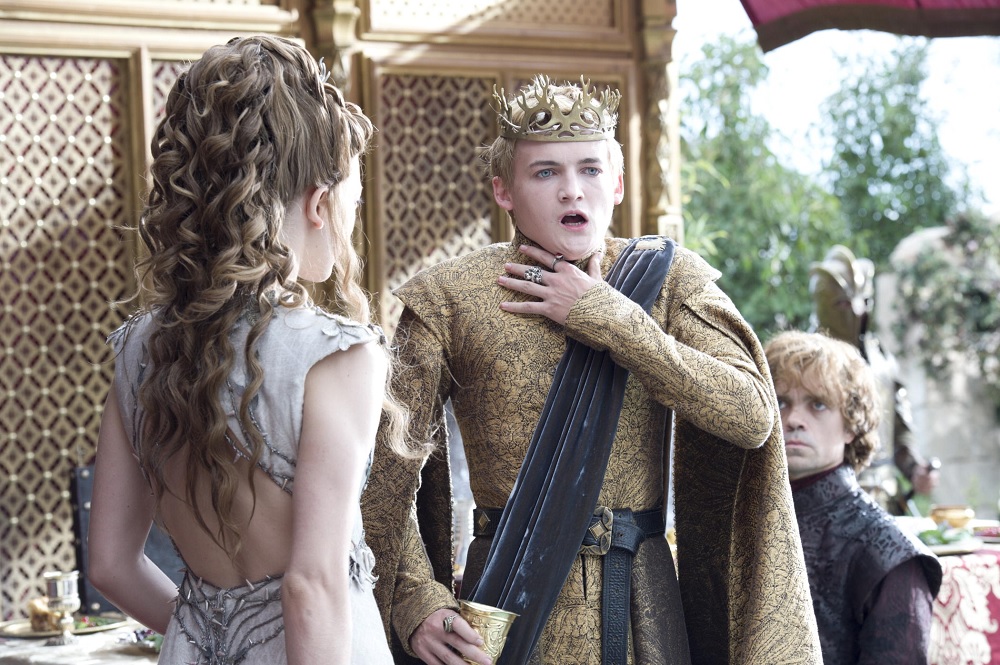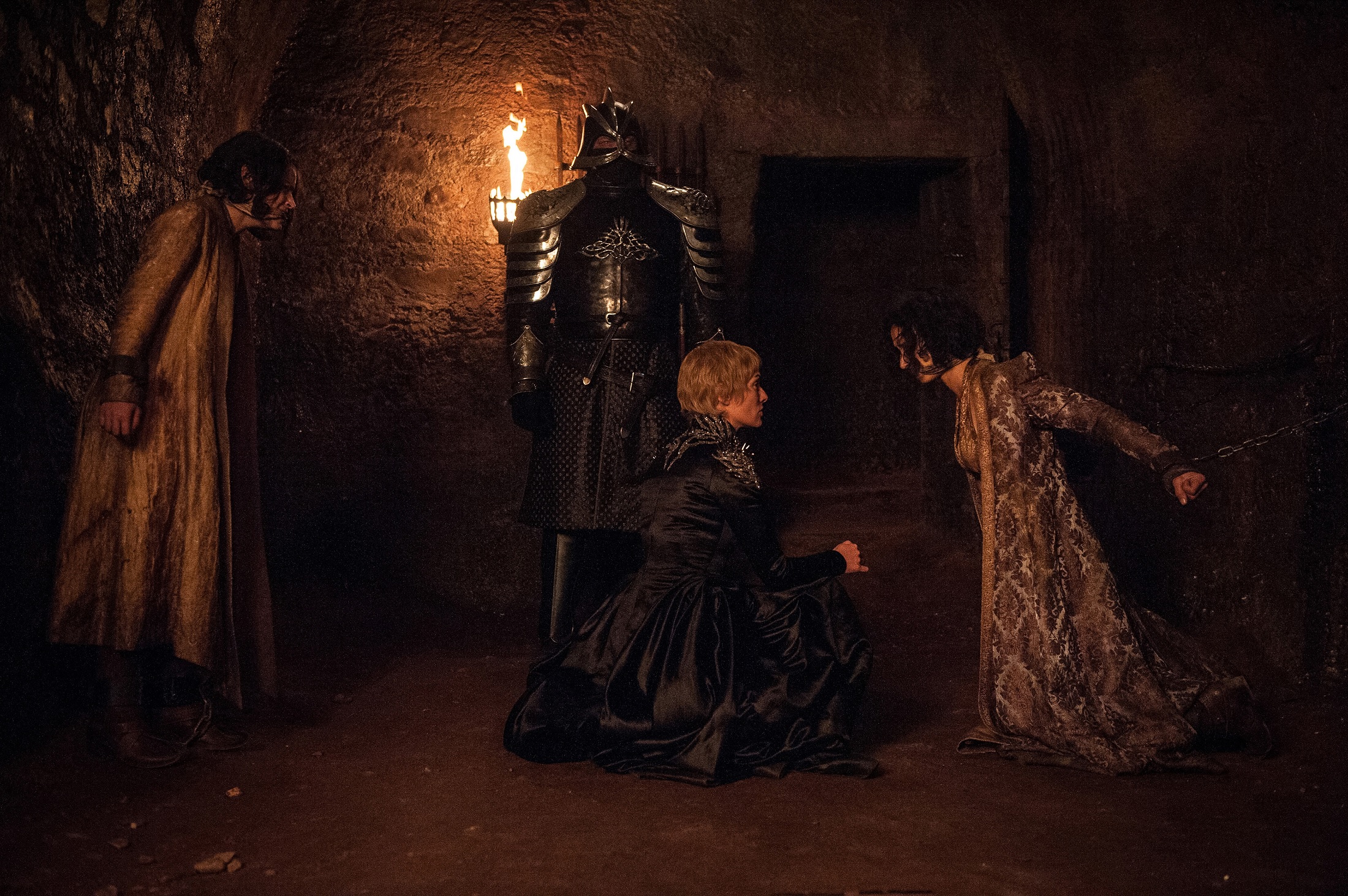Valar Morghulis!
This new weekly column will comb through a particular scene or two from each episode of Game of Thrones that highlight the importance of writing within storytelling. The scenes will be discussed at length with the character and overall narrative beats for the television show and the books when appropriate. I hope you like the column!
The most critical aspect of storytelling is writing. Often when people think of writing, the immediate image they conjure is of verbiage flowing across the skin of a page (eventually being devoured by dust mites if Archmaester Ebrose [Jim Broadbent] is to be believed). While that is certainly accurate in its own right, writing is so much more than that. It is the backbone upon which a narrative can properly unfold and breathe as it does so. It is the embodiment of a voice, allowing the audience into the mind and heart of another being. It is the ability to speak just as much in silence as with language. For me, the most beautiful aspect of writing is that it allows me to be myself, to use my own voice, and present myself to the world in ways that I perhaps otherwise could not.
In an appropriately dramatic circumstance, I contend that the greatest strength and weakness of Game Of Thrones is its writing. Certain sequences have stellar acting and breathtaking cinematography but the writing feels stretched, detached, and inconsistent. While I will leave that aside to subjective discussions, there are two particular sequences in “The Queen’s Justice” that are amongst the best written in the history of the series. They are intimately intertwined through a series of events and in spite of being in different regions of Westeros, their shared history revealing an in-depth understanding of one of George R. R. Martin’s most significant themes in A Song Of Ice and Fire.
In the final scene of the episode, Lady Olenna (Dame Diana Rigg) is observing the oncoming Lannister and Tarly forces with a wry eye. In that moment, she knows that she will die that day and that on account of her stature, it was likely that Jaime Lannister (Nikolaj Coster-Waldau) would deliver the instrument of her demise. Clad in a black dress of mourning, she sits fastidiously in an imposing chair, looking upon her sparsely furnished room. She waits for her death while dimly basking in the golden light permeating her ornate windows.
Ensuring a painless death for herself, Lady Olenna tries to impart some departing wisdom about Cersei to the deliverer of her demise. Unfortunately, Jaime is blind to what Olenna knows: a world built by Cersei is not a world built to last (Cersei’s erroneous usage of the word “dynasty” is indicative of this). As her sharp barbs on Cersei fail to permeate Jaime’s thick skull, she chugs the poisoned wine like I chug my coffee and fires another arrow. This time, it lands right in the heart.
Olenna notes that she had done unspeakable things to ensure the safety and longevity of House Tyrell, including her beloved granddaughter Margaery Tyrell (Natalie Dormer). One of those unspeakable acts, she notes as calmly as if they were discussing the latest tea to hit the Westerosi markets, was to assassinate Joffrey (Jack Gleeson). It was a shocking sight, she admits, watching him claw at his purple throat and gasp for breath. Olenna watches the ensuing shock on Jaime’s visage with a vindictive pleasure. As we would all expect, she ensures that she wins the last word in her own final moments.
Even though Olenna wins in her final moments, however, the fall of Highgarden arrives in part due to her throwing caution to the wind and committing herself wholesale to the destruction of Cersei. Olenna is famed for being a woman with a sharp tongue and a clever mind and remained so in her final moments, but her advice to Daenerys in “Stormborn” about her being a dragon is indicative of a woman who embraced revenge because she no longer had a future to live for. Her desire to see Cersei crumble and fall, preferably along with House Lannister, is an understandable and even defensible one. Yet it is difficult to not see the seeds of the demise of House Tyrell’s blossoming in part due to her defection to the Targaryens.
Joffrey’s assassination inadvertently heralded a new act for Game Of Thrones, ripping apart the admittedly fragile fabric of the Seven Kingdoms and sending it spiraling into the chaos Littlefinger (Aidan Gillen) so ardently adores. Tyrion’s (Peter Dinklage) imprisonment and trial led to Oberyn’s (Pedro Pascal) death and that in turn fueled Ellaria’s (Indira Varma) desire to avenge her lover’s death. It is critically tied to the cruel fate imparted upon Ellaria and Tyene (Rosabell Laurenti Sellers).
Cersei’s punishment is cruel in its callousness. Ellaria and Tyene are responsible for the heartless murder of Myrcella (Nell Tiger Free) and deserve justice for their crimes. Yet there is something truly horrifying about Cersei’s viciousness as she poisons Tyene and sentences Ellaria to watch her daughter rot away in front of her. She’s thrilled by Tyene’s gasp and Ellaria’s harried expressions of anguish. When she remembers the cruelty of Oberyn’s death and when she quietly asks why Ellaria had murdered her only daughter in revenge, Cersei inadvertently hits upon a powerful theme: the futility of revenge.
The cyclical nature of revenge is an especially cruel one because it preys upon a basic human instinct of wanting to viciously protect those we care about. When our loved ones are hurt, that desire to protect becomes overwhelming and all-consuming. We want to punish those who wronged our loved ones but sometimes that punishment feels lacking. Sometimes we want those who wronged our loved ones to suffer, to feel the exact anguish we and our loved ones felt as a consequence of their actions. In those moments, we perhaps feel that that added anguish will deliver satisfaction and closure, but that is rarely the case.
The cycle of revenge in Game Of Thrones and A Song Of Ice and Fire, even when beginning with the sack of King’s Landing by Tywin, is astonishing in its breadth and scope. The brutal rape and murder of Elia Martell and the murders of her children created lines of revenge between several royal houses. Just for the Dornish alone (at least in the television series), the desire to avenge that one act of horrifying brutality has wiped out their entire house and left their once-proud kingdom in the thrall of irrelevancy and chaos.
As horrid as the fates of the aristocratic characters in this series are, however, one cannot forget the suffering the common folk of Westeros endure. From Dorne to the Reach and up to the North, the common folk are ravaged by death, starvation, and utter destruction. The skeletons of the farmer (Finbar Lynch) and his daughter (Trixiebelle Harrowell) that the Hound (Rory McCann) discovered in “Dragonstone” are more than a symbol of a personal journey. They are reminders of the real consequences that befall those without access to power when the oligarchy becomes consumed by its cycles of revenge.
In that suffocating dungeon, Martin’s warnings about the futility of revenge echo throughout the writing. When Cersei’s voice drops to a haunting whisper as she wonders about Myrcella’s fate, you feel the weight of not just the past but also of the actions Cersei was taking in that exact moment. When Tyene cries out for her mother, you feel the weight of her anguish but also the pain of Myrcella as she was dying in front of her father. When you see Ellaria’s anguish, you feel her horror and the strength of the consequences of the actions that led everyone there. In that dungeon, the writing takes the cycle of revenge and makes its consequences so heavy that it feels as if the air itself is about to sink into the ground. There is no dialogue in that final shot as mother and daughter agonizingly try to hold one another before their slow demise, but as their executioner walks away, the power of the scene’s writing makes one imagine what the consequences of this seemingly final act of revenge will be.
Valar Dohaeris,
Akash Of the Andals
The post The Writing On the Wall: The Dornish Rose appeared first on Watchers on the Wall.
Via http://watchersonthewall.com




No comments:
Post a Comment